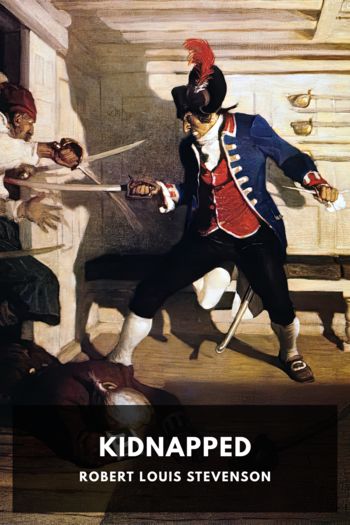Catriona, Robert Louis Stevenson [the gingerbread man read aloud txt] 📗

- Author: Robert Louis Stevenson
Book online «Catriona, Robert Louis Stevenson [the gingerbread man read aloud txt] 📗». Author Robert Louis Stevenson
Here, upon some pretext, Miss Grant left me one day alone with Miss Ramsay. I mind I thought that lady inattentive and like one preoccupied. I was besides yery uncomfortable, for the window, contrary to custom, was left open and the day was cold. All at once the voice of Miss Grant sounded in my ears as from a distance.
“Here, Shaws!” she cried, “keek out of the window and see what I have broughten you.”
I think it was the prettiest sight that ever I beheld; the well of the close was all in clear shadow where a man could see distinctly, the walls very black and dingy; and there from the barred loophole I saw two faces smiling across at me—Miss Grant’s and Catriona’s.
“There!” says Miss Grant, “I wanted her to see you in your braws like the lass of Limekilns. I wanted her to see what I could make of you, when I buckled to the job in earnest!”
It came in my mind she had been more than common particular that day upon my dress: and I think that some of the same care had been bestowed upon Catriona. For so merry and sensible a lady, Miss Grant was certainly wonderful taken up with duds.
“Catriona!” was all I could get out.
As for her, she said nothing in the world, but only waved her hand and smiled to me, and was suddenly carried away again from before the loophole.
The vision was no sooner lost than I ran to the house door, where I found I was locked in; thence back to Miss Ramsay, crying for the key, but might as well have cried upon the castle rock. She had passed her word, she said, and I must be a good lad. It was impossible to burst the door, even if it had been mannerly; it was impossible I should leap from the window, being seven storeys above ground. All I could do was to crane over the close and watch for their reappearance from the stair. It was little to see, being no more than the tops of their two heads each on a ridiculous bobbin of skirts, like to a pair of pincushions. Nor did Catriona so much as look up for a farewell; being prevented (as I heard afterwards) by Miss Grant, who told her folk were never seen to less advantage than from above downward.
On the way home, as soon as I was set free, I upbraided Miss Grant with her cruelty.
“I am sorry you was disappointed,” says she demurely. “For my part I was very pleased. You looked better than I dreaded; you looked—if it will not make you vain—a mighty pretty young man when you appeared in the window. You are to remember that she could not see your feet,” says she, with the manner of one reassuring me.
“O!” cried I, “leave my feet be, they are no bigger than my neighbor’s.”
“They are even smaller than some,” said she, “but I speak in parables like a Hebrew prophet.”
“I marvel little they were sometimes stoned!” says I. “But you miserable girl, how could you do it? Why should you care to tantalise me with a moment?”
“Love is like folk,” says she, “it needs some kind of vivers.”22
“O, Barbara, let me see her properly!” I pleaded. “You can, you see her when you please; let me have half an hour.”
“Who is it that is managing this love affair? You? Or me?” she asked, and as I continued to press her with my instances, fell back upon a deadly expedient: that of imitating the tones of my voice when I called on Catriona by name; with which, indeed, she held me in subjection for some days to follow.
There was never the least word heard of the memorial, or none by me. Prestongrange and his grace the Lord President may have heard of it (for what I know) on the deafest sides of their heads; they kept it to themselves, at least; the public was none the wiser; and in course of time, on November 8th, and in the midst of a prodigious storm of wind and rain, poor James of the Glens was duly hanged at Lettermore by Balachulish.
So there was the final upshot of my politics! Innocent men have perished before James, and are like to keep on perishing (in spite of all our wisdom) till the end of time. And till the end of time, young folk (who are not yet used with the duplicity of life and men) will struggle as I did, and make heroical resolves, and take long risks; and the course of events will push them upon the one side and go on like a marching army. James was hanged; and here was I dwelling in the house of Prestongrange, and grateful to him for his fatherly attention. He was hanged; and behold! When I met Mr. Symon in the causeway, I was fain to pull off my beaver to him like a good little boy before his dominie. He had been hanged by fraud and violence, and the world wagged along, and there was not a pennyweight of difference; and the villains of that horrid plot were decent, kind, respectable fathers of families, who went to kirk and took the sacrament!
But I had had my view of that detestable business they call politics—I had seen it from behind, when it is all bones and blackness; and I was cured for life of any temptations to take part in it again. A plain,





Comments (0)